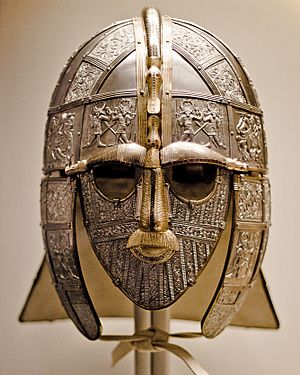Internationales Sachsensymposion facts for kids
The Internationales Sachsensymposion (say "Sax-en-sym-PO-zee-on") is a special group of experts from around the world. They study the history and archaeology of the ancient Germanic people called the Saxons. They also look at how the Saxons were connected to other groups living near the North and Baltic Seas.
This group helps museums and archaeologists share their discoveries. It's seen as a very important place to talk about the early history of northwestern Europe, especially from about 0 to 1000 AD. About 180 members from many countries, like Belgium, Denmark, Germany, and the United States, are part of this society. You have to be chosen to join!
A Look Back: History

How it Started
The Internationales Sachsensymposion began in Cuxhaven, Germany, in 1949. It was first called the Arbeitsgemeinschaft für Sachsenforschung, which means "Study Group for Saxon Research." Karl Waller, who worked to protect ancient sites in Cuxhaven, helped start it. His idea was to make it easier to study the ancient Saxons.
The group also aimed to help countries around the North Sea become friends again after World War II. They did this by focusing on shared archaeological puzzles. Fourteen experts were invited to the very first meeting, which took place from November 21 to 23, 1949. After Karl Waller passed away in 1963, Albert Genrich continued to lead the meetings. Later, Hans-Jürgen Häßler was the chairman from 1996 to 2002.
Important Meetings
The Sachsensymposion has met almost every year since 1949. Their 68th meeting happened in September 2017 in Canterbury, England. It was the first time the conference was held in that city. Universities and archaeological groups in Canterbury helped host it.
Over time, the meetings have grown to cover the archaeology of all early northwestern Europe. While they are often held in Germany, they have also taken place in the Netherlands, Belgium, the Scandinavian countries, and England many times.
A famous moment happened at the 24th meeting in London in September 1973. A copy of the Anglo-Saxon Sutton Hoo helmet was dramatically shown for the first time. The lights were dimmed, and then Nigel Williams walked in with a copy of a special stone from Sutton Hoo. Behind him, Rupert Bruce-Mitford entered wearing the helmet and reciting lines from an old poem called Beowulf.
Who Are the Members?
Members of the Sachsensymposion come from eleven different countries. Some well-known members include Martin Carver, Helena Hamerow, Barbara Yorke, and Alex Woolf. As of 2017, Nancy Wicker from the University of Mississippi was the only American ever chosen to be a member. Early participants included Fritz Tischler and Joachim Werner.

